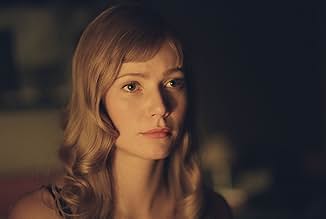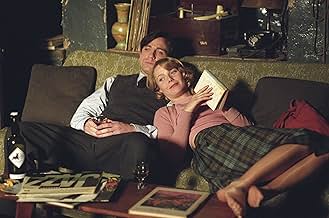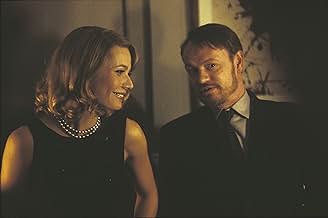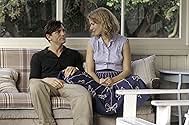AVALIAÇÃO DA IMDb
6,3/10
11 mil
SUA AVALIAÇÃO
A história da relação entre os poetas: Edward James "Ted" Hughes e Sylvia Plath.A história da relação entre os poetas: Edward James "Ted" Hughes e Sylvia Plath.A história da relação entre os poetas: Edward James "Ted" Hughes e Sylvia Plath.
- Prêmios
- 1 vitória no total
Avaliações em destaque
I am pretty familiar with Plath's story, and am also a keen fan of her work, which i think contributed to my hesitancy in seeing the film. I did not have high hopes for this film at all, and honestly, I have to say that I was pleasantly surprised.
My main criticisms:
I found it hard to get past the whole 'Oooh look it's Gwyneth Paltrow as Sylvia Plath'. Someone who isn't famous on a global scale would have been more credible.
The whole premise of the film hinges on the deep passionate relationship of Plath and Hughes, yet I never really felt convinced by it. The relationship came across as quite two dimensional, and even pretty one sided on the part of Paltrow/Plath. Instead of being portrayed as an emotionally fragile woman driven to the edge by Hughes' constant philandering and ultimate betrayal, Plath actually seemed to come across as being deeply insecure and neurotic, constantly suffering from extreme PMT, and overreacting every time she saw Hughes even talking to another woman, rather than having genuine reason to suspect his infidelity.
There were a couple of key dramatic moments (such as after they have made love for the first time, and when they are out in the boat together) that felt very hammy, so disrupted the momentum of the piece.
The score is just awful. Totally totally overwrought, over the top, too loud and too much of it. Plus, as Paltrow/Plath really starts to lose her mind there is an almost constant sound of howling wind in the backgroud. Again, OTT. Less definitely would have been more.
HOWEVER
Ok, I complained about Paltrow above, but she really did a great job. She really is a very talented actress, and it is a shame the whole celebrity thing gets in the way. She was particularly fine in the latter stages of the film, and the sad descent into loneliness and irreversible depression was very well judged.
Likewise, Daniel Craig was very enigmatic, although I wonder whether the one sidedness of the relationship as mentioned above may have come from him.
As a whole the film was very sympathetic, and showed how hard it must have been for Hughes to live with Plath. It doesn't justify his behaviour but rather tries to show an understanding. It also evokes a sense of a time when poets were considered important.
This film stayed with me for some days after watching it, and I would recommend it. It is somewhat uneven in pace and direction, but I think Christine Jeffs is a director with talent, although her inexperience showed. But above all, it renewed my interest in both Plath and Hughes.
7/10
My main criticisms:
I found it hard to get past the whole 'Oooh look it's Gwyneth Paltrow as Sylvia Plath'. Someone who isn't famous on a global scale would have been more credible.
The whole premise of the film hinges on the deep passionate relationship of Plath and Hughes, yet I never really felt convinced by it. The relationship came across as quite two dimensional, and even pretty one sided on the part of Paltrow/Plath. Instead of being portrayed as an emotionally fragile woman driven to the edge by Hughes' constant philandering and ultimate betrayal, Plath actually seemed to come across as being deeply insecure and neurotic, constantly suffering from extreme PMT, and overreacting every time she saw Hughes even talking to another woman, rather than having genuine reason to suspect his infidelity.
There were a couple of key dramatic moments (such as after they have made love for the first time, and when they are out in the boat together) that felt very hammy, so disrupted the momentum of the piece.
The score is just awful. Totally totally overwrought, over the top, too loud and too much of it. Plus, as Paltrow/Plath really starts to lose her mind there is an almost constant sound of howling wind in the backgroud. Again, OTT. Less definitely would have been more.
HOWEVER
Ok, I complained about Paltrow above, but she really did a great job. She really is a very talented actress, and it is a shame the whole celebrity thing gets in the way. She was particularly fine in the latter stages of the film, and the sad descent into loneliness and irreversible depression was very well judged.
Likewise, Daniel Craig was very enigmatic, although I wonder whether the one sidedness of the relationship as mentioned above may have come from him.
As a whole the film was very sympathetic, and showed how hard it must have been for Hughes to live with Plath. It doesn't justify his behaviour but rather tries to show an understanding. It also evokes a sense of a time when poets were considered important.
This film stayed with me for some days after watching it, and I would recommend it. It is somewhat uneven in pace and direction, but I think Christine Jeffs is a director with talent, although her inexperience showed. But above all, it renewed my interest in both Plath and Hughes.
7/10
"Sylvia" is not quite just a slow, straightforward bio-pic of poet Sylvia Plath. While screenwriter John Brownlow has a long background in TV documentaries, director Christine Jeffs has previously made a young woman's mental disquiet dreamily visual in the superb New Zealand film "Rain."
She has her "Rain" cinematographer John Toon bathe the entire film in a nostalgia-tinged amber glow, like the extended flashbacks to the young lovers in the Australian film "Innocence." I think the point is to determinedly place Plath and her husband poet Ted Hughes into their specific time at the cusp before "The Feminine Mystique" put a name to Plath's frustrations and contradictions as a Fulbright scholar - experimental poet turned wife and mother who ultimately turned on herself. ("Mona Lisa's Smile" with Julia Roberts will evidently be dealing with a parallel time and place in a much more Hollywood interpretation.)
As played alternatively languid and aggressive by Gwyneth Paltrow and a Byronic Daniel Craig, they are an actively sensual couple, but notably not Bohemian. They are part of an intellectual but not counter-cultural set. While they are competing for editors' accolades and print space, she's setting her hair, arranging her pearls and cleaning house, like a proper Smith graduate of the time who is perfectly at home visiting her Boston mother (played by real-life mom Blythe Danner) and amidst the books of her late bee scholar father (My friend the PhD in English tells me that the original film title of "The Bee-Keeper's Daughter" would have been fraught with much more significance about Plath's obsessions.)
Hughes celebrates his first big break by asking her to marry him and kids follow one after the other; when they need money he looks to write a children's series for the BBC. Yes, she gets more and more difficult and paranoid, but he is having affairs (and another child) as he attracts more fawning women acolytes.
An earlier suicide effort is referenced a couple of times yet her increasingly heightened mental imbalance as shown here could be post-partum depressions or a Laingian response that insanity is the only rational response to an insane, unfair world. (The film does not seem to side with her loyalist cult which Margaret Atwood satirizes in "The Blind Assassin").
It is always difficult to show a writer at work, but I would have liked to hear more of her poetry than a few passing sentences.
Gabriel Yared's music is lovely and unsentimental.
She has her "Rain" cinematographer John Toon bathe the entire film in a nostalgia-tinged amber glow, like the extended flashbacks to the young lovers in the Australian film "Innocence." I think the point is to determinedly place Plath and her husband poet Ted Hughes into their specific time at the cusp before "The Feminine Mystique" put a name to Plath's frustrations and contradictions as a Fulbright scholar - experimental poet turned wife and mother who ultimately turned on herself. ("Mona Lisa's Smile" with Julia Roberts will evidently be dealing with a parallel time and place in a much more Hollywood interpretation.)
As played alternatively languid and aggressive by Gwyneth Paltrow and a Byronic Daniel Craig, they are an actively sensual couple, but notably not Bohemian. They are part of an intellectual but not counter-cultural set. While they are competing for editors' accolades and print space, she's setting her hair, arranging her pearls and cleaning house, like a proper Smith graduate of the time who is perfectly at home visiting her Boston mother (played by real-life mom Blythe Danner) and amidst the books of her late bee scholar father (My friend the PhD in English tells me that the original film title of "The Bee-Keeper's Daughter" would have been fraught with much more significance about Plath's obsessions.)
Hughes celebrates his first big break by asking her to marry him and kids follow one after the other; when they need money he looks to write a children's series for the BBC. Yes, she gets more and more difficult and paranoid, but he is having affairs (and another child) as he attracts more fawning women acolytes.
An earlier suicide effort is referenced a couple of times yet her increasingly heightened mental imbalance as shown here could be post-partum depressions or a Laingian response that insanity is the only rational response to an insane, unfair world. (The film does not seem to side with her loyalist cult which Margaret Atwood satirizes in "The Blind Assassin").
It is always difficult to show a writer at work, but I would have liked to hear more of her poetry than a few passing sentences.
Gabriel Yared's music is lovely and unsentimental.
It's 1956 Cambridge, England. American student Sylvia Plath (Gwyneth Paltrow) is dismissed by the high-minded poetry review. She is taken with fellow student Edward Ted Hughes (Daniel Craig)'s poems. They eventually get married. He has many female fans and she suspects his infidelity. They have two children. She struggles to write under successful Ted's overwhelming shadow. She falls into depression and eventually commits suicide in 1963.
It's a downbeat biopic that bothers on old-fashion melodrama. Paltrow is lovely but I figured Plath would be more fragile even before her breakdown. Daniel Craig has the prerequisite charisma. The movie is very flat. It is unable to elevate the material into something more dramatic. This is a long drawn out character study that isn't terribly interesting.
It's a downbeat biopic that bothers on old-fashion melodrama. Paltrow is lovely but I figured Plath would be more fragile even before her breakdown. Daniel Craig has the prerequisite charisma. The movie is very flat. It is unable to elevate the material into something more dramatic. This is a long drawn out character study that isn't terribly interesting.
As a young woman, poetess Sylvia Plath meets the fiery Ted Hughes because of one of his poems catching her eye and deeply impressing her. So begins their life together that continues with marriage and the inevitable onset of domestication. As a woman this affects Sylvia more than it seems to affect Ted and she finds herself struggling to write as she balances home life with working as a teacher. Things are made worse by Ted, who has the first of many affairs with a student from Sylvia's class. As the pressures of family and children going to grow, so does Sylvia's mistrust of Ted and paranoia over his behaviour.
When a film is loudly disowned by the child of the subject you do have to approach it with a certain amount of caution and, although I'm not sure why Frieda Hughes took against it, I suspect it is because of the very event-based approach of this film. In a film that shows us how Sylvia was pushed down and had her talent smothered one way or another, it is ironic that the script does something similar by failing to let us understand her poetry, her character or her talent. Instead what we are treated to is a story that shows her being oppressed and beaten down. Now I accept that this is supposedly essentially true, but by ignoring her fame I imagine that this could be seen as just piling more on top of the lot she had while she was alive. It also has the effect of turning a biopic into a relationship melodrama that slowly plods along, pushing Plath down until the ending we know is coming. It is still reasonably interesting but I didn't feel that I learnt anything specific about Plath other than the fact that she was with a man that wasn't particularly good for her which puts her in the company of a lot of woman; the difference between her and them was her poetry but the film doesn't seem too bothered about this.
The upside of this is that Paltrow is best in the role when she is being downtrodden and oppressed; when she is asked to do something other than this then she seems less sure of her character and is less able at least depressed she seems to know what is required of her. Craig is as reliable as usual and does well even if his character is not exactly layered or that complex. The support is mostly pretty good, although I didn't understand what attracted Michael Gambon to such a small role, but the film pretty much belongs to Paltrow, who takes to her downtrodden well.
Overall this was an average film that plays out like a relationship melodrama and didn't do much to help me understand the character or talent of Plath other than showing me what happened within her relationship with Hughes. I can understand why her children objected to this simplification of their mother because personally I would not want to be remembered for my suffering if I had such talent. Paltrow and Craig are both good with the relationship material but the film should have been much better than it was.
When a film is loudly disowned by the child of the subject you do have to approach it with a certain amount of caution and, although I'm not sure why Frieda Hughes took against it, I suspect it is because of the very event-based approach of this film. In a film that shows us how Sylvia was pushed down and had her talent smothered one way or another, it is ironic that the script does something similar by failing to let us understand her poetry, her character or her talent. Instead what we are treated to is a story that shows her being oppressed and beaten down. Now I accept that this is supposedly essentially true, but by ignoring her fame I imagine that this could be seen as just piling more on top of the lot she had while she was alive. It also has the effect of turning a biopic into a relationship melodrama that slowly plods along, pushing Plath down until the ending we know is coming. It is still reasonably interesting but I didn't feel that I learnt anything specific about Plath other than the fact that she was with a man that wasn't particularly good for her which puts her in the company of a lot of woman; the difference between her and them was her poetry but the film doesn't seem too bothered about this.
The upside of this is that Paltrow is best in the role when she is being downtrodden and oppressed; when she is asked to do something other than this then she seems less sure of her character and is less able at least depressed she seems to know what is required of her. Craig is as reliable as usual and does well even if his character is not exactly layered or that complex. The support is mostly pretty good, although I didn't understand what attracted Michael Gambon to such a small role, but the film pretty much belongs to Paltrow, who takes to her downtrodden well.
Overall this was an average film that plays out like a relationship melodrama and didn't do much to help me understand the character or talent of Plath other than showing me what happened within her relationship with Hughes. I can understand why her children objected to this simplification of their mother because personally I would not want to be remembered for my suffering if I had such talent. Paltrow and Craig are both good with the relationship material but the film should have been much better than it was.
After viewing the film on Sylvia Plath, I felt a need to read about this poet and find out exactly what Hollywood did with it. As usual, Hollywood transformed a person's life into what an audience would want to be amused by. Mr. Hughes is personified as a womanizer and adulterer, the later of which may be true. After reading two biographies of Ms. Plath by Linda W. Wagner-Martin and Anne Stevenson and of course having studied Ms. Plath's poetry, I feel that the film, albeit entertaining does not depict her actual identity. It does a marginal account of her life, or part of her life. As any human being, Ms. Plath suffered from many demons. If you ascribe to an astrological standpoint (as Mr. and Mrs. Hughes did) you will find that Sylvia was doomed by her astrological sign, Scorpio. Those of you who are Scorpios know that there is a dark side to this sign. She set her expectations too high of most things and considered the failure of loyalty from her friends and family detrimental. Her experiences with depression only added fuel to the flame. Had she lived in modern times, maybe the newer therapies could have helped her. Depression is a severe affliction and may make a great poet, but for everyday living it can render a person helpless. It can make one helpless with dealing with marriage and children, life in general, and one's occupation. Sylvia Plath was a victim of her depression, her personality overreacting to life and her relationships. Unfortunately, she could not work her way through her inner problems and suffered the result of her mental blockage. Fortunately, for her children, they were unharmed by her mental illness and subsequent actions, and were eventually raised by their father. No one is to blame... no one is superhuman. If standards are set too high for anyone, as Sylvia set for herself, anyone is doomed to failure. We do have her poetry and novel(s) to see her inner self, which no film can properly depict.
Você sabia?
- CuriosidadesFrieda Hughes, Sylvia Plath's daughter and literary executor, didn't allow the producers to access to her mother's poetry. She also publicly denounced the project in a published poem of her own.
- Erros de gravaçãoWhen Ted and Sylvia are in bed together and she is discussing her suicide attempt, you can clearly see Daniel Craig's tattoo through the make up on his shoulder and Gwyneth Paltrow's hair net to which her wig is attached.
- Citações
Sylvia: [to Ted, after making love] We're not even two people. Even before we met, we were just these two halves, walking around with big gaping holes in the shape like the other person. And when we found each other we were finally whole. And then it was as if we couldn't stand being happy so we ripped ourselves in half again.
Principais escolhas
Faça login para avaliar e ver a lista de recomendações personalizadas
- How long is Sylvia?Fornecido pela Alexa
Detalhes
Bilheteria
- Orçamento
- £ 7.000.000 (estimativa)
- Faturamento bruto nos EUA e Canadá
- US$ 1.315.498
- Fim de semana de estreia nos EUA e Canadá
- US$ 58.940
- 19 de out. de 2003
- Faturamento bruto mundial
- US$ 2.917.393
- Tempo de duração1 hora 50 minutos
- Cor
- Mixagem de som
- Proporção
- 2.35 : 1
Contribua para esta página
Sugerir uma alteração ou adicionar conteúdo ausente

Principal brecha
What is the Spanish language plot outline for Sylvia: Paixão Além das Palavras (2003)?
Responda



































